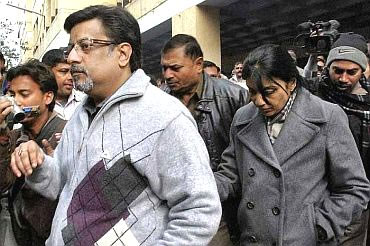
In the second part of his interview with Rediff.com's Sheela Bhatt, he eloquently explains this narrative, like the trauma of murdered Arushi's Talwar's parents; Rahul Gandhi's efforts in bringing a change in the Youth Congress and why he remains unconvinced about the idea of Hindu terrorism.
Part I of the interview: 'People in India are more at peace with themselves'
What are the faultlines of India?
I will give two main ones. One, there is the indifference of people where the State is not functioning properly. You know in certain areas how forced marriages take place. In some areas marginal people are pretty much ignored by the local government.
Then in places like Kashmir where the manner in which violence is being used for the last 20 years has alienated the local population.
The tragedy is that during better times, like the early part of the last decade, not enough was done to find a solution for Kashmir. The Centre starts searching for progress in Kashmir only after the flare-up and violence.
Second, the institutions of the State are failing to keep pace with rapid social changes taking place in India. There are not enough judges, the investigative agencies' capacity to prosecute the corrupt is much too slow and much too feeble. An example is the Central Bureau of Investigation.
I have given the example of the murder of Arushi Talwar. Because the CBI was unable to investigate and find the murderer, they prosecuted Dr Rajesh Talwar whom I know because he is my dentist and I know the case in great detail.
I know he is an innocent man. Can there be anything worse than your child being killed?
You are accused of the murder on the basis of completely bogus evidence!
What are the unifying forces of India?
It's not just some unifying force. It's just the way in which this country works. It's not that you have a choice about it! You can have a problem in a certain condition. For example, you can't have any other country's passport and be an Indian. If you are Pakistani, you can also hold a British passport.
So it may be forced identity as an Indian here, but that's a consequence for social cohesion across the country.
Today's Indians are accused of lacking a sense of history. What's your view?
Who accuses Indians of not having a sense of history?
Many people have accused us. Do you think Indians carry a historical perspective at the back of their minds?
I have written about the way in which history used to be taught in Indian schools. Now, it is taught in a much better and more inspiring way. In addition to that, the people of India have an abiding interest in history.
Okay, the version of history may not be accurate, but people are thinking about it and talking about ideas and you have films which often have historical quality.
I think history is important in India. It's always debated and discussed. One of the purposes of this book was to try to entertain younger Indian readers by showing historical figures in a different light.
Indira Gandhi or Dr Ambedkar may be seen as boring figures from the past, but if you look at them as 'people' and if you know about the decisions that they made, you will find their personal stories are fascinating.
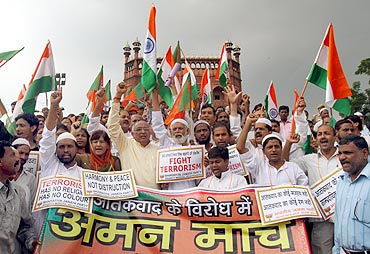
Do you think in the last few years, Hindus or Hinduism has been changing? Does that change signify something very serious and alarming?
I am not convinced by the idea of Hindu terrorism, which is the phrase used now. Rahul Gandhi commented on it, I think we read it in Wikleaks.
I think it is true that Hindu extremists can commit acts of terror, but I don't think that it is an overarching ideology.
Say, for example, somebody from the Hindu community plants a bomb to attack a community. That for me is a form of violent politics. It is about violent opposition between particular groups. It is different from, for example, sending a boatload of people to Mumbai to attack as it happened on 26/11.
As far as I know, there has never been a boatload of RSS pracharaks arriving in Karachi, going to the main mosque and shooting dozens of people. If that would happen that would be Hindu terrorism.
So far the violence practised by people on the fringes of Hindu political groups is something qualitatively different. I think it's a very important distinction.
After 1992 (when the Babri Masjid was demolished in Ayodhya) are Hindus changing? Do they have a deeper saffron colour?
I don't think the Hindutva movement is the same as it was in the 1990s. You should see the reaction of L K Advani or Chief Minister Narendra Modi to the recent Ayodhya court judgment.
Politically, Modi realises that it is not going to take him anywhere. The ability to mobilise large numbers of people over the issue of knocking down the mosque is much less now. It is less politically effective now.
At the political level the main interest is in having good governance. Modi is being re-elected in Gujarat because he has got the power-supply lines and is running an efficient administration. He is not re-elected because of the killings in Gujarat in 2002.
Nitish Kumar in Bihar was also re-elected due to good governance.
There is a belief amongst some experts that Modi, who is considered Hindutva's poster boy, will not gain any ground outside Gujarat.
He may have a future in national politics, but it is hard to say more. The difficulty with him is that he is such a polarising figure that it will be very difficult for the BJP to put him forward. You know, this guy can't even get a visa to go to the United States because of what happened in 2002.
He will be a hugely divisive figure if he came into a central position in national politics. That doesn't mean it is not going to happen. It could happen.
Why do you think Hindus got so angry on February 27, 2002 when the Godhra incident occurred? Why were more than 600 people killed in the first three days after the event at Godhra?
People got angry after reports came in about the way the train had been set on fire. The killings that happened afterwards seem to have a pattern similar to other times.
For example, how the Sikhs were massacred after the assassination of Indira Gandhi when political leaders sat back and allowed mobs to kill people.
The tragedy is that such events are allowed to happen and there seems to be no consequences for the people in authority who allow them to happen.
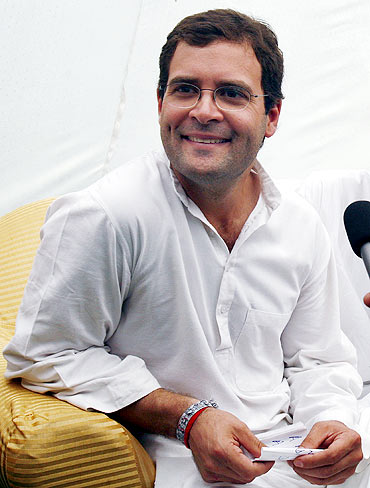
I got very extreme reaction across the parties. Copies of the book are being read by all the main political leaders at this moment as we speak. People in the BJP are saying they have less nepotism.
www.indiasite.com has the complete data. We have biographic details of every MP. We have got some 70,000 hits.
The Congress says we knew this already, but we have been elected.
My hunch is that there is recognition in the Congress that this is a very serious problem. Unless they allow talented, ambitious people without the backing of political families, they are in trouble.
Can I accuse you of being soft on Rahul Gandhi?
(Laughs heartily) I think he is trying to reform the Youth Congress. He is trying to open up access to positions within the Congress.
If he does what he says he is going to do, which is to extend it across the party -- say for example, if there is openness for selection of tickets for the Lok Sabha -- it will be revolutionary.
I have said in the book that his attempt is a good one. It is extremely ambitious and there are many reasons why it may not succeed.
What you have written about Dr Murli Manohar Joshi is very lucid and absorbing.
The way he represents himself is interesting. He has a certain flavour and style. He spoke in detail about the importance of the cow.
As an Englishman, how did you take all the minute details given by Dr Joshi about the cow, cow milk, cow urine and cow dung etc? After all, cow dung is an apt example of the ancient Indian way of life.
Many of these ancient traditions are extremely important. Take, for example, yoga that Indians have been doing for a pretty long time. These things were very useful. Like Pilates, which is an evolved or adjusted form of yoga, is the amazing way of looking after your body.
I do Pilates a couple of times every week. Many Indian traditions have modern applications.
Over time, I have been able to understand Indian emotions like folding your hands every time you see a cow. That is positive emotion. I don't ridicule these traditions. In fact, I try to present these traditions in the context they arrive from.
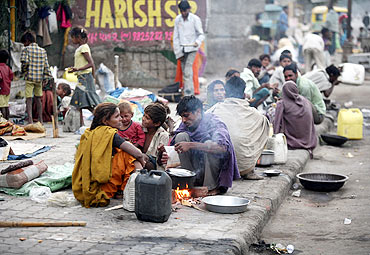
Do you think the idea of the Indian nation and that unifying moral force is taking shape properly?
I do think so. Of course, it is easy to say that my only identity is that of a Malayali or Bengali, but when you go to different parts of India you see people might be speaking different languages, following different traditions and eating different food, but clearly they have a unified identity.
That is partly because of the historical strand going back thousands of years, but it is also because the vision of the new nation the founding fathers had in 1947 meant that first and foremost you are Indian and that is your identity and everything else is secondary.
It was the propaganda in school and that exists to this day. It is very effective propaganda and it has been very beneficial because if you see other countries -- for example, modern Britain -- the sense of national cohesion and national identity is much less because people feel embarrassed to say that you must assert your identity this way.
I think lots of other societies are more dispersed in their idea of a common identity.
You are a historian, but can you make projections about India of the future?
At the end of this century what will India look like? A Hindu India or will the Islamic influence prevail? Will there be a secular India or a Westernised India?
I can't project that far, but I don't think India will be Westernised. Very few rich people may be Westernised as they happen to have a Mercedes.
Yeah... inside the Mercedes they have a Ganesha.
Absolutely! That's the point. I think lots of changes in last few decades are driven internally inside India. I don't think it has come from globalisation or liberalisation. It is taking indigenous shape.
The future of India depends on the inclusion of 300 million poor people in the forward movement.
At the moment one-fourth of the people are largely excluded from the benefits of Indian progress. Unless they are incorporated in the movement for progress, India will have a social problem.
There are fears expressed about India becoming a 'Hindu India.' But I met Maulana (Mehboob) Madani, he makes a point. He says a new generation of younger and educated Muslims have different ambitions than what their parents had or their grandparents had.
Indian Muslims will push forward themselves through ambition and education. At the moment, the dynamism that you see in India extends to every community. I have no doubt about it.
At one place you have said that Hinduism is the unifying force of India.
I am talking about the past. See the exact context. I was mentioning Amartya Sen's talk in the book. Clearly, Hinduism has been the unifying force in the creation of a pan-Indian identity. That is one of the aspects of its future.
I am not suggesting that the sense of Indianness is exclusive to Hindus. The point that Madani made is important. He says we didn't leave our country; we won't go to a foreign country. We will live in India that is our country, that's the best place in the world. I agree with him.
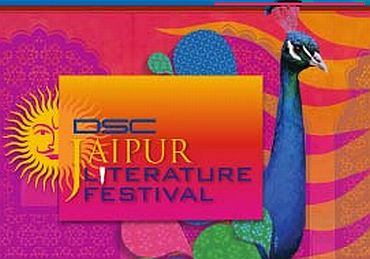
The review in The Guardian by Aravind Adiga is quite scathing. He says this can be the fifth best book on India. He also said your book lacks V S Naipaul's passion, Ramchandra Guha's judgment or Edward Luce's timeliness.
In fact, some non-Indians would like to ask if your marriage to an Indian has influenced you. At the end of the journey, you have a 'conformist's' view on India.
Someone can allege that you are adopting the Indian trajectory and going along with it.
Hmmm. My book is about how I see things....for example the structure of the extended family and how it works in India or about the attitude of people. I see it clearly now than I would have done 20 years ago when I came to India as a student and I was travelling around. I first came to India in 1986 as a teenager.
The point about the Adiga review is that he wrote The White Tiger, which is a book that is full of cliches. It has a lead character who is meant to be a driver, but he speaks in the voice of a grumpy NRI journalist! And the book is full of factual inaccuracies.
In any case, what Adiga has to say is of little importance to me. In fact, some people have engaged the families about whom I have written in the book. That is more significant and more lasting.
A lot has been written about China and India. As the world sees the shift of power to Asia, how do you see India's position in it?
Even if India drops back from a 9 per cent growth rate and whatever way things turn out by the middle of 2050, in a multi-polar world, India will be one of the major powers.
One is conscious of the fact that the Western countries are going to get a big shock and there will be unease and uncertainties about the rise of not only China and India, but also of Malaysia and Indonesia.
I don't think many people in Western Europe or the US comprehend the scale of that change. Let me give you one example. This is in the wake of Gandhiji's Salt March. The Tatas recently bought British salt. More than 50 per cent of salt supplies in the UK is by Indians. There are so many other examples.
I think there is a shift in the economic balance of power. This is going to come out in social understating and literature over period of time. I wonder why there is no novel being written about Indians having increasingly predominant positions in other countries.
Who is the richest person in England? Laxmi Mittal. There is a shift in the structure of global power. People are just beginning to understand the change and consequences of that change. That extends pretty much at every social level.
I think India is already a superpower, whether you like it or not. It is not that India is going to be rich in terms of per capita GDP.
What makes the subject so complex is that there is going to be a substantial number of very poor people in a country that is going to be one of the richest in the world. That is the quandary.
We have to try to understand and India has to try to solve it.
So Ramchandra Guha should come to England one day and write a Portrait of England?
Ram or anyone else should come and write now. Some of the wealthiest writers that I know are Indians. That's the game I am talking about the transfer of power.
When do you get very disturbed while reporting in India?
Often. Often. Poor people from deprived parts of society were extraordinarily direct about their situation. There was turbulence. I give one example.
When I was in Bangalore I saw a new apartment block selling apartments for Rs 2-3-4 crores each. I saw this rising colony and Bengali-Bihari labourers living behind in a disgusting makeshift slum. It was really shocking.
It is not an exactly social problem of a poor village where they search ways to progress. This is the situation where a successful company could have quite easily built decent accommodation for their workers.
What would have been the cost to their profits? Just one percent!